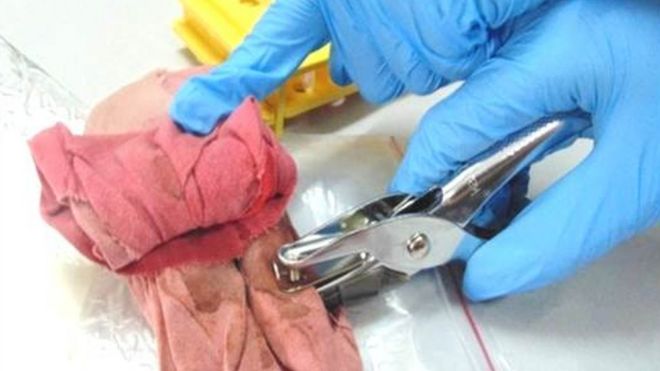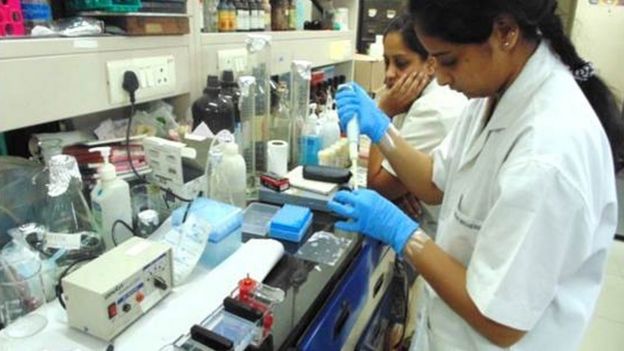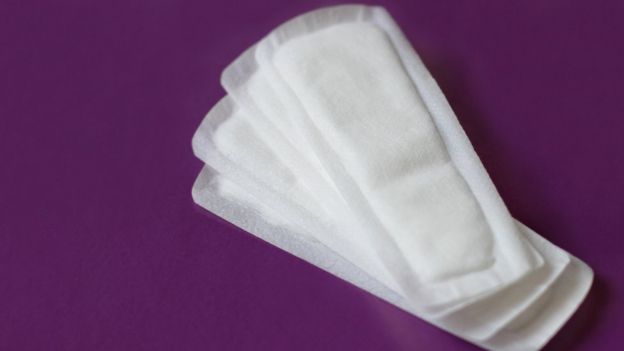- 9 September 2017
- From the sectionHealth
-
(건강) 인도에서 사용한 생리대를 수거하는 이유아름다운 인생/건강 2017. 9. 9. 20:00
출처: http://www.bbc.com/news/health-41147664
Why used sanitary pads are being collected in India
 DR ATUL BUDUKH/TMC HOSPITAL
DR ATUL BUDUKH/TMC HOSPITALFor the study, health workers collected cloth pads used during menstruation, from villagers Menstruation is considered a taboo to even speak about in India, so imagine the reaction to the idea of collecting women's used menstrual pads.
But that is exactly what health workers did in villages in the West Indian state of Maharashtra - in order to diagnose the possibility of cervical cancer. (cervical[|sɜ:rvɪkl] 자궁경부의) (cervical cancer: 자궁경부암) 인도의 의료보건 당국이 이미 사용한 생리대를 수거하는 목적은 자궁경부암의 가능성을 진단하기 위해서이다.
More than a quarter of the world's cervical cancer patients are from India. 전세계 자궁경부암의 1/4이상이 인도에서 발생하기 때문이다.
Yet there are many reasons why women don't go for cervical screening - a lack of adequate infrastructure and facilities in rural areas as well as burdening costs, coupled with unease at undergoing the invasive examination. 자궁검사를 받으러 병원을 찾지 않는 이유: (1) 시골지역의 부족한 의료 인프라와 장비들; (2) 부담스런 의료비용; (3) 불편하게 여기는 외과관련 검사. (coupled with: ~와 결부된) (invasive: 몸에 칼을 대는, 외과적인)
"Rural women are shy, fear the test and consider it unnecessary," said researchers writing in the European Journal of Cancer Prevention.
More than 90% of Indian rural women use homemade cloth as a menstrual pad, as opposed to commercial sanitary products.
Researchers from the Tata Memorial Centre and National Institute for Research in Reproductive Health in India found that by analysing these used menstrual pads, they could detect the presence of human papilloma virus (HPV), which can cause cervical cancer. 연구원들에 의하면, 생리대를 분석함으로써 자궁경부암을 초래하는 파필로마 바이러스의 유무를 확인할 수 있다.
"It is an easy and convenient way," Dr Atul Budukh, lead researcher from the centre, told the BBC.
"The major roadblock to large scale implementation of the cervical cancer screening programme is the low participation by the women at risk." 자궁경부암 검사 프로그램의 주요 장애물은 해당 여성들의 저조한 참여이다. (roadblock to: 장애물)
As a result, doctors say that most cervical cancer patients are only diagnosed at an advanced metastatic stage or when attending hospital for any other medical check-up. 그러다 보니, 대부분 자궁경부암 환자들은 이미 암이 진전된 상태에서 혹은 기타 건강검진 때문에 병원을 찾았다가 자궁경부암을 진단받는다.
Deep freeze DNA
For the research, more than 500 women aged between 30 and 50 with no history of any cancer, who were physically and mentally fit and menstruating regularly, provided their pads for analysis during the two-year research period.
These women were asked to store the menstrual cloth on the first day of their periods in a simple ziplock bag and hand it to the local health worker.
The collected menstrual cloth was then stored at -20C and sent to the diagnostic centre in a dry ice container for HPV screening.
 DR ATUL BUDUKH/TMC HOSPITAL
DR ATUL BUDUKH/TMC HOSPITALIndian scientists process samples of the pads in the lab Genomic DNA was then extracted from dried menstrual blood, amplified and studied using polymerase chain reaction - a technique used in molecular biology.
Twenty-four women tested positive for HPV and were identified for further treatment, said Dr Bhuduk.
This included a colposcopy - a simple procedure used to look at the cervix, the lower part of the womb at the top of the vagina.
The procedure can confirm whether cells in the cervix are abnormal and require treatment.
The researchers also documented the women's socio-demographic and reproductive history, their bathroom and toilet facilities and the type of menstrual device used.
Genital hygiene
The study found an urgent need for intensive health education on genital hygiene.
According to the Census of India 2011, more than 41% of the households do not have bathrooms and of those that do, 16% of the rooms did not have a roof.
Dr Budukh said: "Because of the poor conditions of the bathroom or lack of proper toilet facilities, women in rural areas do not have the privacy to wash their genitals."
 GETTY IMAGES
GETTY IMAGESVery few women in rural India use commercial sanitary products Poor genital hygiene has been found to be an important factor for the development of dysplasia and cervical cancer, and the use of pads made from reused cloth increases that risk, studies have shown.
Collecting the menstrual cloth was a real challenge, the researchers said, partly because of the myths and superstitions surrounding menstruation among the rural population in India.
For example, menstruating women are generally barred from entering the kitchen, visiting temples and attending religious gatherings.
Myths and superstition
This made it difficult for health workers to collect the pads, especially in the evenings, because it is seen as a bad omen for menstruating women to come out after sunset.
Intensive health education programmes on cervical cancer and how to prevent it were organised for village leaders, social workers and family members of the participants.
They were also informed of the myths surrounding menstruation.
There were some limitations to the study - the transporting of the samples was costly and researchers pointed out that development of a simple mechanism of sending the pads for testing by mail would be more efficient than freezer storage.
Only menstruating women can benefit from this screening method, they also noted.
Dr Budukh and his team say that with an improved system for collecting and despatching menstrual pads for testing and good health education, this could become an effective cervical cancer screening tool.
'아름다운 인생 > 건강' 카테고리의 다른 글
(건강/동영상) 뉴스타파: GMO를 먹지 않을 권리 (0) 2018.05.23 (건강) WHO는 공식적으로 게임중독을 "게임장애"로 분류 (0) 2018.01.05 (건강) 치매를 줄이는 9가지 생활습관: 치매 中 3분의1 예방 가능 (0) 2017.07.25 (건강) 영국 10년 실내금연 정책 시행 후 달라진 점들 (0) 2017.07.01 (건강) 오래 살고 싶으면 과일과 야채를 매일 10인분 먹어라 (0) 2017.02.25